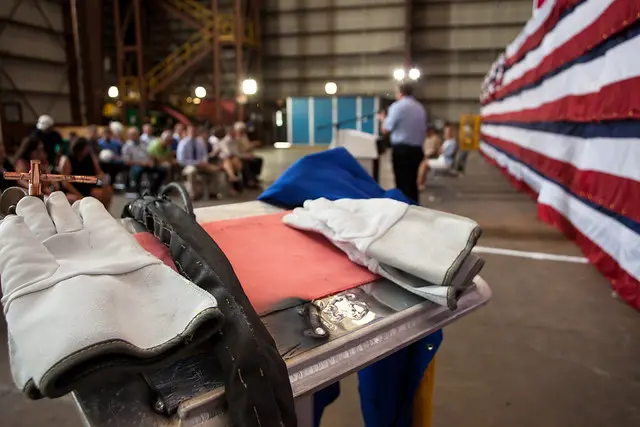
Keel Laid for USS Oakland
(Austal USA)
Original article appears courtesy of Defpost
Austal USA has laid the keel for the U.S. Navy’s Independence variant littoral combat ship, the future USS Oakland (LCS 24), during a ceremony at its shipyard in Mobile, Alabama on July 20.
Ship’s sponsor Kate Brandt ceremoniously laid the keel for the twelfth Independence variant ship of the Littoral Combat Ship (LCS) program, during the ceremony. She will be the third Navy ship to bear the name of Oakland, California.
While keel laying traditionally represents the formal start of a ship’s construction, advanced modular shipbuilding allows fabrication of the ship to begin months in advance. Today, keel laying continues to symbolically recognize the joining of the ship’s components and the ceremonial beginning of the ship’s construction.
In the coming months, Austal will pull one million feet of cable, install 550,000 square feet of insulation, weld 75,000 feet of pipe and shape 850 metric tons of aluminum into the multi mission warship.
Austal has delivered two Independence variant LCS – USS Manchester (LCS 14) and future USS Tulsa (LCS 16) – to the Navy in 2018 while another six are under construction including the future USS Oakland (LCS 24).
Future USS Charleston (LCS 18) is preparing for acceptance trials. Assembly is underway on future USS Cincinnati (LCS 20) and future USS Kansas City (LCS 22) and modules for future USS Mobile (LCS 26) and future USS Savannah (LCS 28) are under construction. Additionally, Austal has one more LCS in a pre-construction phase, the future USS Canberra (LCS 30).
LCS is a high speed, agile, shallow draft, mission-focused surface combatant designed for operations in the littoral environment, yet fully capable of open ocean operations.
As part of the surface fleet, LCS has the ability to counter and outpace evolving threats independently or within a network of surface combatants. Paired with advanced sonar and mine hunting capabilities, LCS provides a major contribution, as well as a more diverse set of options to commanders, across the spectrum of operations.
Each LCS will be outfitted with a mission package made up of reconfigurable mission modules containing warfighting systems and support equipment. A dedicated crew will combine with aviation assets to deploy manned and unmanned vehicles and sensors in support of mine countermeasures (MCM), anti-submarine warfare (ASW) or surface warfare (ASuW) missions.
An interchangeable mission package is embarked on each LCS and provides the primary mission systems in one of these warfare areas.
The LCS-class consists of the Freedom-variant and Independence-variant, designed and built by two industry teams. The Freedom-variant team is led by Lockheed Martin (for the odd-numbered ships, e.g. LCS 1) while the Independence-variant team is led by Austal USA (for LCS 6 and follow-on even-numbered ships).
Tags: keel, uss oakland
